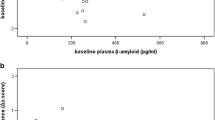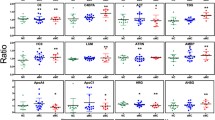Abstract
Growing evidence advanced the idea that the soluble form of the receptor for advanced glycation end-products (sRAGE) might serve as a risk marker for several disorders including Alzheimer disease. We found a reduced level of circulating sRAGE in patients with mild cognitive impairment (MCI). The reduction of sRAGE in MCI, as well as the anticipation of the disease in patients with the lowest sRAGE levels (≤225 pg/ml), suggest a role of the RAGE axis in the pathogenesis of the disease.

Similar content being viewed by others
References
Arancio O, Zhang HP, Chen X et al (2004) RAGE potentiates Abeta-induced perturbation of neuronal function in transgenic mice. EMBO J 23:4096–4105
Bierhaus A, Humpert PM, Morcos M et al (2005) Understanding RAGE, the receptor for advanced glycation end products. J Mol Med 83:876–886
Bucciarelli LG, Wendt T, Rong L et al (2002) RAGE is a multiligand receptor of the immunoglobulin superfamily: implications for homeostasis and chronic disease. Cell Mol Life Sci 59:1117–1128
Emanuele E, D’Angelo A, Tomaino C et al (2005) Circulating levels of soluble receptor for advanced glycation end products in Alzheimer disease and vascular dementia. Arch Neurol 62:1734–1736
Falcone C, Emanuele E, D’Angelo A et al (2005) Plasma levels of soluble receptor for advanced glycation end products and coronary artery disease in nondiabetic men. Arterioscler Thromb Vasc Biol 25:1032–1037
Geroldi D, Falcone C, Emanuele E (2006a) Soluble receptor for advanced glycation end products: from disease marker to potential therapeutic target. Curr Med Chem 13:1971–1978
Geroldi D, Falcone C, Minoretti P et al (2006b) High levels of soluble receptor for advanced glycation end products may be a marker of extreme longevity in humans. J Am Geriatr Soc 54:1149–1150
Hixson JE, Vernier DT (1990) Restriction isotyping of human apolipoprotein E by gene amplification and cleavage with HhaI. J Lipid Res 31:545–548
Lue LF, Yan SD, Stern DM et al (2005) Preventing activation of receptor for advanced glycation endproducts in Alzheimer’s disease. Curr Drug Targets CNS Neurol Disord 4:249–266
McKhann G, Drachman D, Folstein M et al (1984) Clinical diagnosis of Alzheimer’s disease: report of the NINCDS ADRDA Work Group under the auspices of Department of Health and Human Services Task Force on Alzheimer’s disease. Neurology 34:939–944
Petersen RC, Doody R, Kurz A et al (2001) Current concepts in mild cognitive impairment. Arch Neurol 58:1985–1992
Petersen RC, Smith GE, Waring SC et al (1999) Mild cognitive impairment: clinical characterization and outcome. Arch Neurol 56:303–308
Yan SD, Roher A, Chaney M et al (2000) Cellular cofactors potentiating induction of stress and cytotoxicity by amyloid beta-peptide. Biochim Biophys Acta 1502:145–157
Acknowledgments
This work was supported by grants 2004/agreement number 533 F/B/1, “Strategico” 2006, RC 2007 Italian Ministry of Health.
Author information
Authors and Affiliations
Corresponding author
Rights and permissions
About this article
Cite this article
Ghidoni, R., Benussi, L., Glionna, M. et al. Decreased plasma levels of soluble receptor for advanced glycation end products in mild cognitive impairment. J Neural Transm 115, 1047–1050 (2008). https://doi.org/10.1007/s00702-008-0069-9
Received:
Accepted:
Published:
Issue Date:
DOI: https://doi.org/10.1007/s00702-008-0069-9




